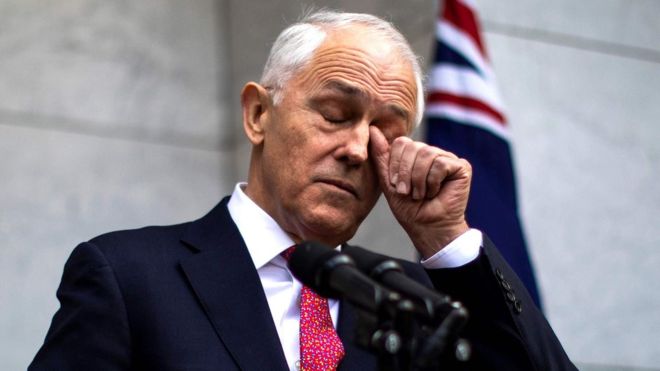
The disgruntled former prime minister is a rather large, and growing club, on the Australian scene. The country has become known for its killing seasons, those occasions when spear wielding apparatchiks within respective political parties feel the need to execute (politically speaking) their leaders in hurried fashion. Those leaders, in turn, seek revenge and catharsis. None, it seems, seek obscurity, forever aggrieved by the instigator of their fall.
The latest addition to the club is lawyer, merchant banker, and failed pro-republic campaigner Malcolm Turnbull, who is now without the leadership of his party or a seat in the Australian parliament, one he resigned as the daggers were being sheathed. If he could not have the prime ministership, his party could not have the seat of Wentworth.
Attempting to maximise the effect of his deposition, Turnbull began a campaign of ennobling self-effacement and cleansing. This involved, firstly, evacuating to New York and then extolling his views about a “live-by-the-sword, die-by-the-sword approach.” To a young leadership group in New York, Turnbull explained how “when you stop being prime minister, that’s it.”
His approach to politics would, he argued, be different from his disgruntled predecessors who had similarly been pushed onto their party’s respective swords. “There is no way I’m going to be hanging around like an embittered Kevin Rudd or Tony Abbott – well, seriously, I mean, these people are just sort of like miserable, miserable ghosts.”
Rudd was quick on the counter, directing a “quick reality check” to Turnbull in a tweet. “[H]aving told the world you’ve left politics behind, you seem to be in the media every day talking about it.” Turnbull would also do to notice that Rudd left parliament some five years ago. “Why not come over for a cuppa?”
Turnbull, having himself accused his predecessors of irate, narcissistic reflections lengthily bitter, took a very public, generously provided platform from the Australian Broadcasting Corporation’s Q&A program Thursday last week to counter that gang of nine behind palace coup.
It was also a display replete with its liberal approaches to what might be loosely called the factual record. The disgruntled former prime minister, by definition, must extol and inflate virtues, making predecessor and successor look poor. A million jobs, he claimed without demur, were created whilst he was prime minister. The figure, more accurately, was 793,783. Business, supposedly, was responsible for that creation; in actual fact, the figures from the Australian Bureau of Statistics showed an increase in public sector jobs during the Turnbull period.
Most blatantly of all, Turnbull, in an act of brazenly adopted innocence, ignored the policy failings that characterised a period of misrule and mismanagement. Despite claiming to be a prime minister of infrastructure, the figures over the 2015-2018 period, as gauged by the Construction Activity: Chain Volume Measures document of the Australian Bureau of Statistics, show mixed results: $95.48 billion in 2015-6; $86.99 billion in 2016-7 and $105.47 billion in 2017-8. Contrast that with engineering construction work totalling $113.63 billion in 2014-5 and $136.07 billion in 2013-4.
Most damnably, Turnbull was left pure and untouched on the issue of his messy and bungling role behind the national broadband network (NBN), a fiasco that will forever dog his period in office. The global credit ratings agency S&P Global Ratings rubbished the entire NBN operation with stinging lashings, claiming that Australia’s governments had “underestimated the complexity of the NBN roll out” warning of the need for writedowns and additional government funding, “potentially in the form of debt relief or direct subsidies.”
In October last year, Turnbull reiterated an approach he had developed when communications minister: heap blame upon the Labor government for putting him in the mess. “Well, it was a mistake to go about the way they [Labor] did; setting up a new government company to do it was a big mistake.” Money invested was money lost.
Simon Jarman, a resident of Northcote in Victoria, was far from impressed with such characteristic Turnbull deflections and ducking. On a task for the World Bank in impoverished Moldova for a time, he reflected on having speeds of up to 100mbps reliably for up to $20 a month. “Back here, for $80 a month,” went his letter in The Age, “I’m forced to work with the technological equivalent of a horse and cart.” That’s innovation for you.
At virtually every significant turn, Turnbull was found wanting, capitulating to the right wing heavies under the pretext of preserving an open church, yet looking weak and unconvincing for not maintaining the upper hand. On energy and power prices, he faltered; on the issue of environment, he stumbled. In terms of immigration and national security, one could be forgiven for thinking that he had surrendered total control to the behemoth of the Home Affairs department run by his nemesis, Peter Dutton. This, from a legally trained mind not indifferent to the importance of civil rights.
Neither audience nor interlocutor, Tony Jones, seemed too keen on ruffling or disturbing any self-inflicted illusion on the Q&A program. This was Turnbull’s chance to shine in aggrieved wonder and hurt. He accused the right of the Liberal party of intimidation and bullying. He warned his fellow party members that losing the political centre would result in political defeat. There was even a risk, at one point, of feeling pity.
It is ultimately hard to pity a being who profited from the very acts that he accused his counterparts of committing against him. Turnbull’s justification? – his own assassination of Abbott in 2015 had been executed for soundly articulated reasons (the “economy, stupid” line comes to mind); his opponents were mere political suicides without vision and full of malice. “Revenge,” as Sir Francis Bacon famously observed, “is a wild kind of justice; which the more man’s nature runs to, the more ought law to weed out.” Such lessons are lost on disgruntled ex-prime ministers.
Dr. Binoy Kampmark was a Commonwealth Scholar at Selwyn College, Cambridge. He lectures at RMIT University, Melbourne. Email: [email protected]









































